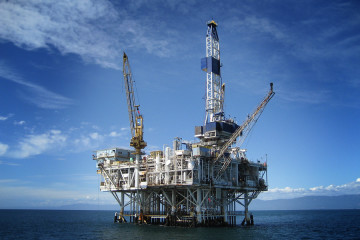Obama to Fight Court Ruling That Struck Down Fracking Rules

(Bloomberg) —The Obama administration will fight a federal judge’s ruling overturning its effort to regulate hydraulic fracturing on public lands, a decision that struck another blow to the president’s environmental legacy.
“We’ll continue to make our case in the courts,” White House spokesman Josh Earnest said at a briefing Wednesday. “We believe that we have a strong argument to make about the important role that the federal government can play in ensuring that hydraulic fracturing that’s done on public land doesn’t threaten the drinking water of the people who live in the area.”
The ruling, issued late Tuesday by Wyoming-based District Court Judge Scott W. Skavdahl, blocks the U.S. Bureau of Land Management from enforcing a 2015 rule that set detailed standards for the construction of oil and gas wells drilled into some 700 million acres of federal land. Although it would apply only to acreage under the BLM’s control, it was seen as a model for states to follow as they regulate drilling on private land.
“It’s part of a general push back by the courts” to the Obama administration’s environmental regulations, said James Coleman, a law professor who specializes in energy issues at Southern Methodist University. “You’re definitely seeing skepticism of the extent to which the Obama administration is arguably bypassing Congress.”
Power Plan
The decision follows similar setbacks for other pieces of President Barack Obama’s environmental legacy, including a Supreme Court stay of the Clean Power Plan that forces states to slash carbon dioxide emissions from power plants and legal wrangling over a rule dictating some waters are under U.S. jurisdiction.
The fracking rule would have forced companies to disclose the chemicals they pump underground and seal off waste water in storage tanks. The Interior Department, in an e-mail, called Tuesday’s ruling “unfortunate.”
“It prevents regulators from using 21st century standards to ensure that oil and gas operations are conducted safely and responsibly on public and tribal lands,” the department said.
Local Requirements
The regulation has never gone into force, amid a legal challenge from oil industry groups and four states — Colorado, North Dakota, Utah and Wyoming — that argued the measure duplicated local drilling requirements and boosted the cost of extracting oil and gas from federal lands.
Judge Skavdahl said the fracking rule exceeded the Bureau of Land Management’s powers.
The legal question is “not whether hydraulic fracturing is good or bad for the environment,” Skavdahl said, but whether Congress gave the Interior Department the power to regulate it.
“Congress has not delegated to the Department of Interior the authority to regulate hydraulic fracturing,” Skavdahl wrote. “The BLM’s effort to do so through the fracking rule is in excess of its statutory authority and contrary to law.”
Temporary Hold
Skavdahl used similar reasoning in putting a temporary hold on the measure last year. Tuesday’s decision came just a day after the U.S. filed a brief arguing for reversal of the preliminary injunction. That matter is still pending before a Denver-based U.S. appeals court.
His Tuesday decision didn’t reach some of the legal arguments raised by the Independent Petroleum Association of America, the Western Energy Alliance and other challengers who objected to the rule.
Independent Petroleum Association of America spokesman Neal Kirby said the decision reaffirms the group’s view that “states are — and have for over 60 years been — in the best position to safely regulate hydraulic fracturing.”
Environmentalists who supported the rule said it’s essential to safeguard water supplies and neighboring communities as energy companies increasingly use hydraulic fracturing to extract oil and gas from wells nationwide. The technique involves pumping sand, water and chemicals underground to free oil and gas from the pores of dense rock formations.
Environmental Groups
In a brief, environmental groups argued that the mandates wouldn’t cost much — about one fourth of one percent of the cost of drilling each new well — and in exchange would limit the risk of groundwater contamination, chemical spills, wildlife deaths and other accidents.
“While there is no way to ever make fracking safe, the oil and gas industry has repeatedly proven that it needs more standards to keep the public safe from the dangers of fossil fuels, not less,” said Lena Moffitt, director of the Sierra Club’s Beyond Dirty Fuels campaign.
Some court rulings on other Obama administration environmental regulations have directed federal agencies to tweak the measures or justify them anew. But because Skavdahl’s decision went to the heart of the Interior Department’s authority, “there’s nothing to remand, no do-over,” said Kathleen Sgamma, vice president of government and public affairs at the Western Energy Alliance.
The Bureau of Land Management faces similar questions about its authority as it moves to block companies from burning natural gas or sending it unchecked into the atmosphere as a byproduct at oil wells on federal land. The agency proposed limits on that practice in January and aims to make them final later this year. Methane is the primary component of natural gas; it also is a potent contributor to climate change.
“BLM is extremely vulnerable as it overreaches well beyond its public lands mandate and into EPA’s jurisdiction,” Sgamma said by e-mail.
1920 Law
Conservationists prodding the BLM to clamp down on methane releases say the agency is on solid legal footing because a 1920 law governing U.S. mineral leasing specifically directs actions “to prevent waste of oil or gas” developed on federal lands.
“The oil and gas industry sweeps these provisions under the rug,” said Erik Schlenker-Goodrich, executive director of Western Environmental Law Center. But the BLM, as steward of the pubic lands, has an “obligation to manage oil and gas resources in the public interest.”
The cases are State of Wyoming v. U.S. Department of the Interior, 15-cv-43, U.S. District Court, District of Wyoming (Casper) and Independent Petroleum Association of America v. Jewell, 15-cv-41, U.S. District Court, District of Wyoming (Casper).







No Comment